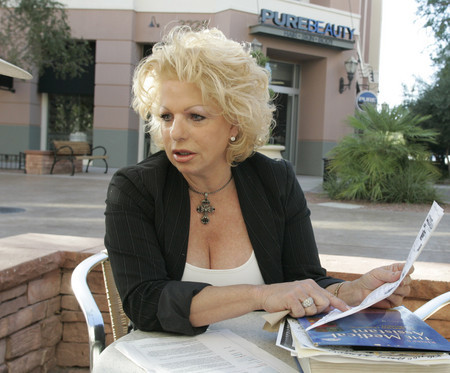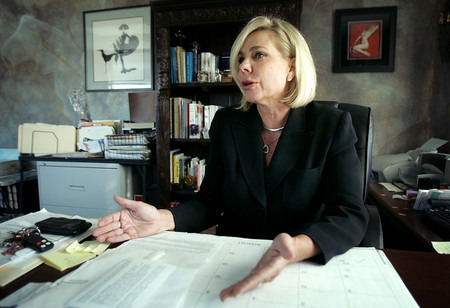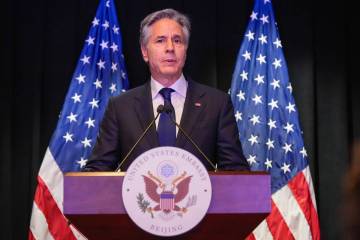Medical assistants feel pinch
Rebecca Luth couldn't believe it.
One day she was making up to $300 an hour at The Body Spa injecting Botox into patients who wanted to hide their wrinkles. The next day all she could do was inject her opinion into a growing public debate on what medical assistants should be able to do.
"It's not fair," the medical assistant said, weeping as she sat at a table outside a coffee shop in Henderson last week. "I've been injecting Botox and other (cosmetic) fillers for years. My patients love me.
"They tell me I do it better than doctors. And now, just like that, the medical board said I can no longer do my job. Why this change?"
The Nevada State Board of Medical Examiners has suddenly forced change in a big way to the delivery of vanity cosmetic procedures. Emergency regulations enacted Friday reinforce a long-ignored rule that prohibits medical assistants from injecting people with Botox and collagen drugs. These assistants have been working in salons operating under the license of medical doctors.
The new regulations do allow medical assistants to provide flu shots and vaccinations, practices which it turns out also were prohibited under the 30-year-old law.
Health officials called the emergency session because, without the changes, they feared long lines for seasonal and swine flu vaccines and because medical assistants were being laid off as a result of confusion and uncertainty about the law.
Under Nevada law, no training or educational background is required for the position of medical assistant. Nevertheless, many medical assistants, including Luth, received certificates from vocational schools or community colleges such as the College of Southern Nevada. Others receive on-the-job training from physicians.
The new directives are applauded by some as health care measures that keep Nevadans safer as they pursue the Fountain of Youth through a hypodermic needle.
Others see the rules as perhaps the unintended result of a strategy by plastic surgeons, including board member Dr. Benjamin Rodriguez, who wanted to see more regulation of medical spas and their medical assistants. Critics say this increased regulation would end up benefiting plastic surgeons.
Some health care professionals believe the recent hepatitis outbreak in Southern Nevada was the catalyst for the action.
"Why did the medical board do this now?" Luth asks.
The answer to that question, which has been asked by everyone from politicians to Botox users, depends on who you talk to.
To Louis Ling, the medical board executive director who actually wrote the new regulations, the answer is simple: "We have to do the right thing when we find out something is wrong."
How could it be that a law which made it illegal for medical assistants to give shots of any kind was either unknown to the medical community -- or ignored -- for 30 years?
Ling won't even speculate.
"I don't know," he said.
But Dr. Leonard Kreisler, a former chief of staff at University Medical Center, said physicians long knew about the law but didn't want to pay a large number of registered nurses and physician assistants in their offices to do the work.
"It was simple economics," Kreisler said.
Larry Pinson, executive director of the Nevada State Board of Pharmacy, suggested that physicians decided they "could just deputize people to do these things."
NOW WAS THE TIME
Regardless of why the law was never enforced, Ling said now was the time to clarify what medical assistants could do.
Ling said he learned in August from Rodriguez, who recently was reappointed to the board by Gov. Jim Gibbons, and other physicians that some doctors were allowing medical assistants to inject Botox and other cosmetic fillers under their licenses at spas with no supervision.
"There was some abuse in this area by physicians," Ling said.
Ling said he became convinced that something should be done soon, even though there had been no sentinel event in which a Nevadan was badly harmed by a cosmetic filler.
"We can't let Nevadans be at risk," he said. "I know that there are some medical assistants who can probably do this well, but there are others we can't say that about. When you're a regulator, you have to make some tough calls when you're dealing with serious drugs like Botox."
Botox carries such a serious risk of side effects, including breathing problems, that earlier this year the Food and Drug Administration issued an order to place black box warnings on the injectable toxin, a warning usually reserved for drugs that have caused fatal heart attacks or strokes.
Ling said that because he was aware of the old law that made it illegal for medical assistants to administer potent drugs, he was able to call for a "clarification" of what medical assistants do.
"I had been general counsel of the (Nevada State) Pharmacy Board, so I knew about the law. I had to act."
Dr. Robert Feingold, a former Focus Medical Spa medical director who allowed medical assistants to do injections under his license, said it has long been common knowledge in the medical community that doctors at medical spas are not on premises "all the time."
"I was there about four hours a day," he said.
Feingold said he believes the focus on medical assistants by public health officials has come as a result of the hepatitis outbreak. "They don't want that kind of infection problem again."
He said the mandatory use of small, single dose vials of Botox by Nevada health officials is a direct result of the outbreak, in which nine hepatitis cases were linked to the now-closed Endoscopy Center of Southern Nevada.
SAFETY OR BOTTOM LINE?
Rodriguez has previously voiced concerns about how medical spas work.
Minutes of an open meeting of the board in May 2007 reported:
"Dr. Rodriguez stated that the issue of non-physician spa personnel practicing medicine without a license by giving injections and using lasers without the physician seeing the patient before and after treatment and just signing off on the charts is something that should be brought before the legislature."
Some in the Las Vegas health care community, such as Dr. Ivan Goldsmith, an internist who provides Botox to patients, and Tracy Hurst, owner of The Medical Spa at Summerlin, maintain that Rodriguez's chief concern is really the bottom line of plastic surgeons.
Hurst has said it's not necessary for a doctor to be present for all the types of services spas provide, including skin care and anti-aging procedures. More regulation means more medical assistants at salons are out of business, she said.
Goldsmith said the practices of plastic surgeons "are way down in the great recession. ... He's (Rodriguez) always allowed his medical assistants to give Botox."
Rodriguez wouldn't comment. But his daughter and public relations manager, Noelle Rodriguez, said those criticisms don't reflect her father's reasons for pressing for change in how injections are delivered.
"Dr. Rodriguez's position on the medical board has nothing to do with his personal potential net gain," Noelle Rodriguez wrote in a e-mail. "Fillers and Botox make up a minuscule part of his practice."
But Hurst said the reason plastic surgeons want the cosmetic filler business is because it often leads to expensive procedures later on. Though refusing to name names, Hurst said plastic surgeons have told her about this business strategy.
Although a $500 Botox treatment may seem like chump change in comparison to a $20,000 breast augmentation, Hurst said plastic surgeons and their representatives do all they can to talk patients into getting expensive elective surgery whenever they come in for a treatment.
"They're good salesmen," she said. "They eventually wear them down."
Dr. Tracy Hankins, a local plastic surgeon, said it is wrong to think that people in his profession only care about money when it comes to injections.
"It's safety for patients that we care about," he said.
Hankins said he has been surprised to learn that so much "unsupervised injecting" was done at spas.
Rodriguez was a part owner of the Skin Care Institute on Sahara for years, according to former owner and now manager Amber Tsang. Rodriguez got out of the business in 2007, according to his daughter, but she couldn't remember how long he had been there.
Tsang said Rodriguez brought a woman from his office, Monica de la Cruz, to teach medical assistants at the Skin Care Institute how to inject Botox and other fillers.
Tsang said she is sure that Rodriguez's desire to have physicians more in control of injections did not mean he wanted to outlaw their administration by medical assistants.
"He is very close to Monica and wouldn't do anything to hurt her," she said. "He just wanted all the Botox and filler business coming to him and other plastic surgeons instead of salons because it would benefit them."
Noelle Rodriguez said de la Cruz enjoyed a sterling reputation for injecting.
"I'm sure he (Rodriguez) didn't see all this coming," Tsang said.
According to Noelle Rodriguez, her father had always thought it was legal for medical assistants to give injections, but he just wanted more physician involvement for safety purposes.
Feingold said one of the medical assistants working under his license was Betty Guerra, who recently was charged by the state attorney general's office with practicing medicine without a license.
Edie Cartwright, a spokeswoman for the office, said Guerra was charged after a complaint was forwarded by the medical board. Cartwright said she believes that arrest focused more attention on medical assistants, particularly in the salon community.
Despite his reservations about Rodriguez, Goldsmith concedes that some accidental good may have come out of the plastic surgeon's call for more oversight in injections.
"We shouldn't have medical assistants injecting something that dangerous," he said. "They won't know what to do if something goes wrong."
Luth, a strong proponent of safety, says Goldsmith is wrong.
"I've taken every class I can so I can do injections safely," she said. "I even have taught doctors."
She fears that losing her livelihood will snowball into other problems.
"I'm going to lose my house, everything," she said.
Dion Frayle, one of Luth's longtime clients, wants her to continue giving him Botox injections.
"She's so much better than a doctor," Frayle said. "She does a much better job and cares more than all the plastic surgeons I've ever gone to."
Contact reporter Paul Harasim at pharasim @reviewjournal.com or 703-387-2908.


























